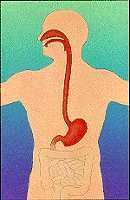 In the realm of digestive disorders, Irritable Bowel Syndrome (IBS) stands as an enigmatic condition that affects millions of people worldwide. Characterized by a combination of perplexing symptoms, IBS can significantly impact an individual's quality of life. In this comprehensive guide, we'll delve into the intricate details of IBS, exploring its causes, symptoms, and effective management strategies.
In the realm of digestive disorders, Irritable Bowel Syndrome (IBS) stands as an enigmatic condition that affects millions of people worldwide. Characterized by a combination of perplexing symptoms, IBS can significantly impact an individual's quality of life. In this comprehensive guide, we'll delve into the intricate details of IBS, exploring its causes, symptoms, and effective management strategies.
Understanding Irritable Bowel Syndrome
-
The Enigma of IBS Unveiled:
Irritable Bowel Syndrome is a functional gastrointestinal disorder characterized by a cluster of symptoms, including abdominal pain, bloating, and changes in bowel habits. Unlike inflammatory bowel diseases, such as Crohn's or ulcerative colitis, IBS doesn't cause structural damage to the digestive tract.
-
Classifying IBS:
IBS is often classified into four main types based on predominant symptoms:
- IBS-D (Diarrhea-predominant)
- IBS-C (Constipation-predominant)
- IBS-M (Mixed type)
- IBS-U (Unsubtyped)
Understanding the predominant symptom helps in tailoring effective treatment plans.
Causes of Irritable Bowel Syndrome
- The Multifactorial Nature of IBS:
Unraveling the exact cause of IBS is akin to solving a complex puzzle. It is believed to be a multifactorial condition, with factors such as genetics, gut motility issues, and abnormal gut-brain communication playing crucial roles. - Gut Microbiota and IBS:
The gut microbiota, a diverse community of microorganisms residing in the digestive tract, has emerged as a key player in IBS. Imbalances in the microbiota, known as dysbiosis, can contribute to IBS symptoms. Probiotics and dietary changes are among the strategies aimed at restoring balance.
Symptoms and Diagnosis
-
Decoding IBS Symptoms:
IBS manifests with a range of symptoms, making diagnosis challenging. Common symptoms include abdominal pain or discomfort, altered bowel habits, bloating, and gas. The variability in symptoms adds to the complexity of IBS diagnosis.
-
Diagnostic Criteria:
The Rome criteria are often used to diagnose IBS, requiring the presence of specific symptoms for a defined duration. However, given the heterogeneity of symptoms, a thorough evaluation is crucial, ruling out other potential causes.
Management Strategies
-
Lifestyle Modifications:
Lifestyle plays a pivotal role in managing IBS. Dietary modifications, stress reduction techniques, and regular exercise are foundational in symptom control. Identifying trigger foods and incorporating a well-balanced diet can significantly alleviate symptoms.
-
Pharmacological Approaches:
Medications may be prescribed based on predominant symptoms. Antispasmodics, laxatives, and medications targeting gut motility are commonly used. However, the efficacy varies from person to person, highlighting the need for personalized treatment plans.
-
Psychological Interventions:
The intricate connection between the gut and the brain is evident in IBS. Cognitive-behavioral therapy (CBT) and mindfulness techniques have shown promise in alleviating symptoms by addressing the psychological aspects of the condition.
Emerging Trends and Research
-
Probiotics and IBS:
Ongoing research explores the role of probiotics in modulating gut microbiota and alleviating IBS symptoms. Probiotic strains such as Bifidobacterium and Lactobacillus show promise in restoring microbial balance and reducing symptom severity.
-
Dietary Approaches:
The low FODMAP (fermentable oligosaccharides, disaccharides, monosaccharides, and polyols) diet has gained attention for its efficacy in managing IBS symptoms. By reducing the intake of certain fermentable carbohydrates, this diet aims to minimize gut irritation.
Conclusion
In conclusion, Irritable Bowel Syndrome remains a perplexing yet prevalent condition affecting millions globally. Through a holistic approach encompassing lifestyle modifications, pharmacological interventions, and emerging trends in research, effective management strategies can be tailored to individual needs. As we continue to unravel the mysteries of IBS, a comprehensive understanding will pave the way for improved treatments and enhanced quality of life for those grappling with this intricate digestive disorder.
Disclaimer:
The information on this website is provided for educational and information purposes only and is not medical advice. Always consult with a licensed medical provider and follow their recommendations regardless of what you read on this website. If you think you are having a medical emergency, dial 911 or go to the nearest emergency room. Links to other third-party websites are provided for your convenience only. If you decide to access any of the third-party websites, you do so entirely at your own risk and subject to the terms of use for those websites. Neither Arnon Lambroza, M.D., P.C., nor any contributor to this website, makes any representation, express or implied, regarding the information provided on this website or any information you may access on a third-party website using a link. Use of this website does not establish a doctor-patient relationship. If you would like to request an appointment with a health care provider, please call our office at 212-517-7570.


